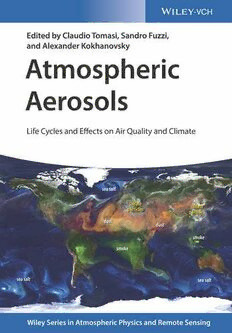
Atmospheric Aerosols: Life Cycles and Effects on Air Quality and Climate PDF
Preview Atmospheric Aerosols: Life Cycles and Effects on Air Quality and Climate
Editedby ClaudioTomasi,SandroFuzzi,and AlexanderKokhanovsky AtmosphericAerosols WileySeriesinAtmosphericPhysicsandRemoteSensing SeriesEditor:AlexanderKokhanovsky Wendisch,M./Brenguier,J.-L.(eds.) Huang,X./Yang,P. AirborneMeasurementsfor RadiativeTransferProcessesin EnvironmentalResearch WeatherandClimateModels MethodsandInstruments 2013 North,G.R./Kim,K.-Y. CoakleyJr.,J.A./Yang,P EnergyBalanceClimate Models AtmosphericRadiation APrimerwithIllustrativeSolutions Davis,A.B./Marshak,A. 2014 Multi-dimensionalRadiative Stamnes,K./Stamnes,J.J. Transfer RadiativeTransferinCoupled EnvironmentalSystems Theory,Observation,andComputation AnIntroductiontoForwardandInverse Modeling Minnis,P.etal. 2015 SatelliteRemoteSensingof Tomasi,C./Fuzzi,S./Kokhanovsky,A. Clouds (eds.) AtmosphericAerosols LifeCyclesandEffectsonAirQualityand Zhang,Z.etal. Climate PolarimetricRemoteSensing 2016 AerosolsandClouds Forthcoming: Weng,F. Kokhanovsky,A./Natraj,V. SatelliteMicrowaveRemote AnalyticalMethodsin Sensing AtmosphericRadiative Transfer FundamentalsandApplications EditedbyClaudioTomasi,SandroFuzzi,and AlexanderKokhanovsky Atmospheric Aerosols LifeCyclesandEffectsonAirQualityandClimate TheEditors AllbookspublishedbyWiley-VCHare carefullyproduced.Nevertheless,authors, Prof.ClaudioTomasi editors,andpublisherdonotwarrantthe InstituteofAtmosphericSciences& informationcontainedinthesebooks, ClimateISAC includingthisbook,tobefreeoferrors. AreadellaRicercadelCNR Readersareadvisedtokeepinmindthat ViaGobetti101 statements,data,illustrations,procedural 40129Bologna detailsorotheritemsmayinadvertently Italy beinaccurate. LibraryofCongressCardNo.:appliedfor Prof.SandroFuzzi InstituteofAtmosphericSciences& ClimateISAC BritishLibraryCataloguing-in-Publication AreadellaRicercadelCNR Data ViaGobetti101 Acataloguerecordforthisbookisavail- 40129Bologna ablefromtheBritishLibrary. Italy Bibliographicinformationpublishedbythe Dr.AlexanderKokhanovsky DeutscheNationalbibliothek EUMETSAT TheDeutscheNationalbibliothek RemotesensingProducts liststhispublicationintheDeutsche EUMETSAT-Allee1 Nationalbibliografie;detailed 64295Darmstadt bibliographicdataareavailableonthe Germany Internetat<http://dnb.d-nb.de>. and ©2017Wiley-VCHVerlagGmbH&Co. KGaA,Boschstr.12,69469Weinheim, MoscowEngineeringPhysicsInstitute Germany (MEPhI) NationalResearchNuclearUniversity Allrightsreserved(includingthoseof KashirskoeStr.31 translationintootherlanguages).Nopart 115409Moscow ofthisbookmaybereproducedinany Russia form – byphotoprinting,microfilm,or anyothermeans – nortransmittedor AbookoftheWileySeriesinAtmospheric translatedintoamachinelanguage PhysicsandRemoteSensing withoutwrittenpermissionfromthe publishers.Registerednames,trademarks, TheSeriesEditor etc.usedinthisbook,evenwhennot specificallymarkedassuch,arenottobe Dr.AlexanderKokhanovsky consideredunprotectedbylaw. EUMETSAT RemotesensingProducts PrintISBN:978-3-527-33645-6 EUMETSAT-Allee1 ePDFISBN:978-3-527-33643-2 64295Darmstadt ePubISBN:978-3-527-33641-8 Germany MobiISBN:978-3-527-33642-5 oBookISBN:978-3-527-33644-9 and CoverDesign Grafik-DesignSchulz MoscowEngineeringPhysicsInstitute Typesetting SPiGlobal,Chennai,India (MEPhI) PrintingandBinding NationalResearchNuclearUniversity KashirskoeStr.31 Printedonacid-freepaper 115409Moscow Russia Cover NASA V Contents ListofContributors XV Preface XIX Foreword XXI Acknowledgments XXIII 1 PrimaryandSecondarySourcesofAtmosphericAerosol 1 ClaudioTomasiandAngeloLupi 1.1 Introduction 1 1.2 AGeneralClassificationofAerosolSources 6 1.3 PrimaryAerosolsofNaturalOrigin 7 1.3.1 Sea-SaltParticles 8 1.3.2 MineralDust 13 1.3.3 BiogenicAerosols 20 1.3.4 ForestFireSmoke 23 1.3.5 VolcanicDustintheTroposphere 27 1.3.6 CosmicDust 30 1.4 SecondaryAerosolsofNaturalOrigin 31 1.4.1 NaturalSulfateParticlesfromTroposphericSO andSulfur 2 Compounds 32 1.4.2 NaturalNitrateParticlesfromTroposphericNitrogenOxides 37 1.4.3 OrganicAerosolsfromBiogenicVolatileOrganicCompounds 41 1.4.4 SulfateParticlesfromMarineandVolcanicSO Formedinthe 2 Stratosphere 42 1.5 PrimaryAnthropogenicAerosols 48 1.5.1 IndustrialDust 50 1.5.2 AnthropogenicAerosolsfromFossilFuelCombustionand Carbonaceous(Soot)Particles 51 1.5.3 AnthropogenicAerosolsfromWasteandBiomassBurning 58 1.6 SecondaryAnthropogenicAerosols 59 1.6.1 SecondaryParticlesfromSO 60 2 1.6.2 SecondaryParticlesfromNO 64 x 1.6.3 SecondaryOrganicAerosols 68 VI Contents 1.7 ConcludingRemarksontheGlobalAnnualEmissionFluxesof NaturalandAnthropogenicAerosolMass 70 Abbreviations 75 ListofSymbols 75 References 76 2 AerosolNucleationintheTerrestrialAtmosphere 87 KarineSellegriandJulienBoulon 2.1 Introduction 87 2.2 TheoreticalBasisofNucleationandGrowthofNewParticlesinthe Atmosphere 88 2.2.1 IntroductiontoNucleationTheoriesUsefulinAtmospheric Sciences 88 2.2.1.1 TheUnarySystemModel 89 2.2.1.2 TheH SO −H OBinarySystem 91 2 4 2 2.2.1.3 TheH SO −NH −H OTernarySystem 93 2 4 3 2 2.2.1.4 TheRoleofAmines 93 2.2.1.5 TheIon-InducedNucleation 94 2.2.2 TheGrowthofNewParticles 95 2.2.2.1 TheCondensationProcess 95 2.3 ObservationandDetectionTools 97 2.3.1 DetectionTools 98 2.3.1.1 PhysicalCharacterization 98 2.3.1.2 ChemicalCharacterization 99 2.3.2 MetricsforCharacterizingNewParticleFormationEvents 100 2.3.3 OccurrenceofNewParticleFormationEventsinthe Troposphere 102 2.3.3.1 PristineandPollutedContinentalBoundaryLayer 102 2.3.3.2 CoastalandMarineBoundaryLayerSites 103 2.3.3.3 High-AltitudeEnvironmentsandFreeTroposphere 103 2.4 PrecursorCandidatesforNucleationandEarlyGrowthfrom Observations 104 2.4.1 ContinentalPlanetaryBoundaryLayer 104 2.4.2 MarinePlanetaryBoundaryLayer 104 2.5 ParameterizationsandChamberExperiments 105 2.6 ImportanceofNucleationfortheProductionofAerosolsandCCNat theGlobalScale 107 2.7 Conclusions 108 Abbreviations 109 ListofSymbols 110 References 110 3 Coagulation,Condensation,DryandWetDeposition,andCloud DropletFormationintheAtmosphericAerosolLifeCycle 115 ClaudioTomasiandAngeloLupi 3.1 Introduction 115 Contents VII 3.2 PhysicalGrowthProcesses 120 3.2.1 BrownianCoagulation 121 3.2.2 GrowthbyCondensationofGasesontoPreexistingParticles 128 3.2.3 TheKelvinEffect 130 3.2.4 HygroscopicGrowthofParticlesbyWaterVapor Condensation 133 3.3 AerosolRemovalProcesses 139 3.3.1 DryDepositionofAerosolParticles 141 3.3.2 WetDepositionofAerosolParticles 144 3.3.2.1 In-CloudScavenging(Rainout) 145 3.3.2.2 InterstitialAerosolScavengingbyCloudDroplets 147 3.3.2.3 PrecipitationScavenging 149 3.3.2.4 WetDepositioninFogs 157 3.3.2.5 NucleationofIceParticles 157 3.4 FormationofCloudParticles 161 3.4.1 WaterVaporCondensation 162 3.4.2 TheKöhlerTheory 163 3.4.3 TheCloudCondensationNuclei 169 3.5 ConcludingRemarks 170 Abbreviations 175 ListofSymbols 175 References 180 4 ChemicalCompositionofAerosolsofDifferentOrigin 183 StefaniaGilardoniandSandroFuzzi 4.1 Introduction 183 4.2 GlobalDistributionandClimatologyoftheMainAerosolChemical Constituents 184 4.2.1 DefinitionofPrimaryandSecondaryInorganicandOrganicAerosol Compounds 184 4.2.2 AerosolGlobalBudgets 186 4.2.2.1 OrganicAerosol 186 4.2.2.2 BlackCarbonAerosol 187 4.2.2.3 SulfurAerosol 188 4.2.2.4 NitrogenAerosolSpecies 189 4.2.2.5 DustAerosol 191 4.2.3 MainRegionalDifferencesandSeasonalVariationsofAerosol ChemicalComposition 192 4.2.3.1 UrbanAerosol 192 4.2.3.2 RuralAerosol 193 4.2.3.3 ContinentalRegionalBackgroundAerosol 194 4.2.3.4 MarineBackgroundAerosol 195 4.3 SizeDistributionsofAerosolChemicalCompounds 196 4.3.1 AerosolSize-ResolvedChemicalCompositioninPolluted Areas 196 VIII Contents 4.3.1.1 SecondaryInorganicAerosol(AmmoniumSulfateandNitrate) 197 4.3.1.2 OrganicAerosol 197 4.3.1.3 BlackCarbon 198 4.3.1.4 Dust 200 4.3.2 AerosolSize-ResolvedChemicalCompositioninUnperturbed Environments 200 4.3.2.1 RainForest 200 4.3.2.2 HighAltitudeMountainRegions 200 4.3.2.3 PolarRegions 202 4.3.3 Long-TermChangesofAerosolChemicalComponents 203 4.4 IssuesRelatedtoAerosolChemicalComposition 205 4.4.1 CharacterizationoftheAerosolCarbonaceousFraction 205 4.4.1.1 Soot:BCorEC 205 4.4.1.2 OrganicAerosol 207 4.4.2 SourcesofBCandOA 209 4.4.2.1 BlackCarbon 209 4.4.2.2 OrganicAerosol 211 4.4.3 EffectofOrganicandInorganicChemicalCompositiononAerosol ActivityasCloudCondensationNucleiandIceNuclei 213 4.4.3.1 CloudCondensationNuclei 213 4.4.3.2 IceNuclei 214 Abbreviations 216 ListofSymbols 217 References 218 5 AerosolOptics 223 AlexanderA.Kokhanovsky 5.1 Introduction 223 5.2 Absorption 224 5.3 Scattering 229 5.4 Polarization 234 5.5 Extinction 237 5.6 RadiativeTransfer 239 5.7 ImageTransfer 242 Abbreviations 244 ListofSymbols 244 References 245 6 AerosolModels 247 ClaudioTomasi,MauroMazzola,ChristianLanconelli,andAngeloLupi 6.1 Introduction 247 6.2 ModelingoftheOpticalandMicrophysicalCharacteristicsof AtmosphericAerosol 249 6.2.1 The6SCodeAerosolExtinctionModels 254 Contents IX 6.2.1.1 TheFour6SBasicAerosolComponents 254 6.2.1.2 TheThree6SAerosolModels 258 6.2.2 The6SAdditionalAerosolModels 262 6.2.3 The6SModified(M-Type)AerosolModels 271 6.2.4 TheOPACAerosolModels 277 6.2.5 TheAerosolModelsofShettleandFenn(1979) 288 6.2.6 TheSevenAdditionalAerosolModelsofTomasietal.(2013) 295 6.2.7 ThePolarAerosolModels 304 6.3 GeneralRemarksontheAerosolParticleNumber,Surface,and VolumeSize-DistributionFunctions 306 6.3.1 TheAerosolParticleNumberSize-DistributionFunction 310 6.3.2 TheAerosolSurface,Volume,andMassSizeDistributions 314 6.4 Size-DistributionCharacteristicsofVariousAerosolTypes 317 6.4.1 RemoteContinentalAerosols 317 6.4.2 FreeTroposphericAerosols 319 6.4.3 Rural-ContinentalAerosols 319 6.4.4 Continental-PollutedAerosols 322 6.4.5 MaritimeCleanAerosols 322 6.4.6 Maritime-PollutedAerosols 324 6.4.7 DesertDust 324 6.4.8 BiomassBurningAerosols 326 6.4.9 UrbanAerosols 326 6.4.10 PolarArcticAerosols 328 6.4.11 PolarAntarcticAerosols 329 6.4.12 StratosphericVolcanicAerosols 331 6.5 ConcludingRemarks 332 Abbreviations 333 ListofSymbols 334 References 337 7 RemoteSensingofAtmosphericAerosol 341 AlexanderA.Kokhanovsky,ClaudioTomasi,BoyanH.Petkov, ChristianLanconelli,MaurizioBusetto,MauroMazzola,AngeloLupi,and KwonH.Lee 7.1 Introduction 341 7.2 Ground-BasedAerosolRemoteSensingMeasurements 342 7.2.1 TheMultispectralSun-PhotometryMethod 345 7.2.1.1 CalibrationofaSunPhotometerUsingtheLangleyPlot Method 346 7.2.1.2 DeterminationofAerosolOpticalThickness 348 7.2.1.3 DeterminationofAerosolOpticalParametersfromSun-Photometer Measurements 360 7.2.1.4 RelationshipbetweentheFineParticleFractionandA˚ngström WavelengthExponent 370 X Contents 7.2.2 MeasurementsofVolumeExtinction,Scattering,andAbsorption CoefficientsatGroundLevelUsingNephelometerandPSAP Techniques 373 7.2.3 VerticalProfilesofBackscatterandExtinctionCoefficientsfrom LIDARMeasurements 375 7.2.4 MeasurementsoftheAerosolSizeDistributionUsinganOptical ParticleCounter 378 7.3 AirborneRemoteSensingMeasurementsofAerosolOptical Properties 380 7.3.1 MainResultsDerivedfromtheSecondAirborneArctic StratosphericExpedition(AASE-II)Measurements 385 7.3.2 AirborneRemoteSensingMeasurementsduringtheArmyLIDAR VerificationExperiment(ALIVE) 386 7.3.3 AirborneMeasurementsPerformedduringtheSulfateCloudsand Radiation–Atlantic(SCAR-A)Experiment 386 7.3.4 AirborneMeasurementsConductedduringtheTropospheric AerosolRadiativeForcingObservationalExperiment (TARFOX) 387 7.3.5 TheAerosolCharacterizationExperiment2(ACE-2)Airborne RemoteSensingMeasurements 388 7.3.6 AirborneRemoteSensingMeasurementsduringthePuertoRico DustExperiment(PRIDE) 391 7.3.7 TheARCTAS/ARCPACAirborneRemoteSensingMeasurementsin theWesternArctic 392 7.3.8 TheAirborneMeasurementsConductedduringthePan-Arctic MeasurementsandArcticRegionalClimateModelIntercomparison Project(PAM-ARCMIP) 399 7.4 Satellite-BorneAerosolRemoteSensingMeasurements 403 7.4.1 SatelliteInstrumentation 403 7.4.2 Methods 411 7.4.2.1 TheAlgorithmsBasedontheSingle-ViewSpectral Observations 411 7.4.2.2 Double-ViewSpectralObservations 412 7.4.2.3 MultiviewSpectralObservations 413 7.4.2.4 MultiviewSpectralandPolarimetricObservations 413 7.4.2.5 RetrievalsoverOceanUsingMultianglePolarimetric Observations 414 7.4.2.6 RetrievalsoverLand 414 7.4.2.7 AerosolRetrievalUsinganArtificialNeuralNetwork Technique 414 7.4.3 ExamplesofAerosolRetrievals 415 7.4.3.1 GlobalViewofAerosolDistributionfromPassiveSensor 415 7.4.3.2 AerosolRetrievalfromDifferentSensorsandRetrieval Algorithms 416 7.4.3.3 Time-ResolvedObservationfromGeostationaryPlatform 419
